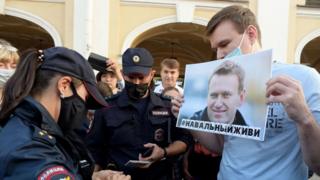 Image copyright
Getty Images
Image caption
A rally expressed support for Mr Navalny who is unconscious
Image copyright
Getty Images
Image caption
A rally expressed support for Mr Navalny who is unconscious
Russian doctors say leading opposition figure Alexei Navalny remains too ill to be transferred to Germany for treatment after a possible poisoning.
Mr Navalny has been in a coma since Thursday when he fell ill on a flight and his supporters called the doctors' decision "a direct threat to his life".
They have cited a report of "a deadly substance", dangerous not only to Mr Navalny but to all around him.
However, a doctor now says "no poisons have been detected" by the tests.
Mr Navalny is a prominent critic of Russian President Vladimir Putin.
His team suspects a poisonous substance was put in his tea at an airport cafe.
Activists in Germany have sent a plane to bring Mr Navalny to Berlin for treatment.
The head doctor at the hospital in Siberia where he is being treated said Mr Navalny's condition had improved a little, but that he was still unstable. Alexander Murakhovsky said legal questions would need to be resolved before Mr Navalny could be moved.
But Mr Navalny's team said it was "deadly" for him to remain in the hospital.
"The ban on the transportation of Navalny is an attempt on his life, which is being made right now by doctors and the deceitful authorities who sanctioned it," Mr Navalny's spokeswoman Kira Yarmysh wrote on Twitter.
What is happening with the air ambulance?
The Berlin-based Cinema for Peace Foundation said it had organised a plane to pick up Mr Navalny and bring him back to Berlin, where the Charite hospital was ready to treat him.
It said the aircraft had medical equipment and a team specialised in treating coma patients on board.
The Cinema for Peace Foundation was founded by activist and filmmaker Jaka Bizilj. In 2018, it arranged for the treatment of Pyotr Verzilov - an activist with Russian protest group Pussy Riot - who had symptoms of poisoning.
The air ambulance arrived in the Siberian city of Omsk on Friday morning, according to flight tracking data.
Both Germany and France have said they were happy to help with treatment. German Chancellor Angela Merkel said "he can receive from us all the help and medical support needed".
Polish Prime Minister Mateusz Morawiecki said he was "very concerned" by the reports of the alleged poisoning and the refusal to move Mr Navalny.
"We need to be 100% sure that his safety is guaranteed. Poland supports the efforts to provide Mr. Navalny with best available treatment," he tweeted.
A spokesperson for Mr Putin said on Thursday that the Kremlin would help move Mr Navalny abroad if necessary and wished him a "speedy recovery".
What happened to Alexei Navalny?
Mr Navalny fell ill during a flight from Tomsk to Moscow and his plane made an emergency landing in Omsk, Siberia.
"Alexei has toxic poisoning," spokeswoman Ms Yarmysh tweeted.
Image copyright EPA Image caption A man in Moscow watches social media footage of Mr Navalny being stretchered to an ambulanceVideo footage on social media shows Mr Navalny being taken on a stretcher to an ambulance on the airport runway.
Other disturbing video appears to show a stricken Mr Navalny in pain on the flight. Passenger Pavel Lebedev said he heard the activist "screaming in pain".
Another photograph on social media purports to show Mr Navalny drinking from a cup at a Tomsk airport cafe.
He was taken to hospital where Ms Yarmysh said he was on a ventilator and in a coma. Police officers filled the hospital and his belongings were being confiscated, she added.
Mr Navalny's wife, Yulia Navalnaya, was initially denied access to her husband because authorities said the patient had not agreed to the visit, Ms Yarmysh said, although she was later allowed on to the ward.
His doctor Anastasia Vasilyeva said earlier that hospital doctors were refusing to provide records of his condition.
What's the latest on his condition?
Mr Nalvany's family want to transport him to another clinic for safety reasons, Ms Yarmysh said.
Speaking on Friday, Dr Murakhovsky declined to answer questions about whether the opposition figure had been poisoned, saying only that there were five possible diagnoses and that test results would be available in two days.
But in comments later in the morning, deputy head doctor Anatoly Kalinichenko said no traces of poison had been found in tests carried out on Mr Navalny so far. He added that the hospital already had a diagnosis but could not disclose it yet.
Ivan Zhdanov, an associate of Mr Navalny, earlier on Friday said he had been told by an official that a "deadly substance" had been used, which posed a threat not only to the opposition figure's life, but also those around him.
Image copyright EPA Image caption Mr Navalny's wife, Yulia Navalnaya, is at the hospital but was initially denied access to her husbandMs Yarmysh told the Echo of Moscow radio station that she was "sure it was intentional poisoning".
State news agency Tass cited a police officer saying, "we can't rule out that he drank or took something himself yesterday."
Ms Yasmysh dismissed this as "complete rubbish" and said he had been swimming in a river the night before and was sober.
Who is Alexei Navalny?
He made a name for himself by exposing official corruption, labelling Mr Putin's United Russia as "the party of crooks and thieves", and has served several jail terms.
In June, he described a vote on reforms allowing Mr Putin to serve another two terms in office - after the four terms he has already had - as a "coup" and a "violation of the constitution".
In 2011 he was arrested and imprisoned for 15 days following protests over vote-rigging by Mr Putin's United Russia party in parliamentary elections.
Mr Navalny was briefly jailed in July 2013 on embezzlement charges but denounced the sentence as political.

Media playback is unsupported on your device
He attempted to stand in the 2018 presidential race but was barred because of previous fraud convictions in a case he again said was politically motivated.
Mr Navalny was also given a 30-day jail term in July 2019 after calling for unauthorised protests.
He was taken ill during that jail sentence. Doctors diagnosed him with "contact dermatitis" but he said he had never had any acute allergic reactions and his own doctor suggested he might have been exposed to "some toxic agent". Mr Navalny also said he thought he may have been poisoned.
Mr Navalny also suffered a serious chemical burn to his right eye in 2017 when he was assaulted with green, antiseptic dye.
Last year his Anti-Corruption Foundation was officially declared a "foreign agent", enabling the authorities to subject it to more checks.

 5 years ago
564
5 years ago
564 

